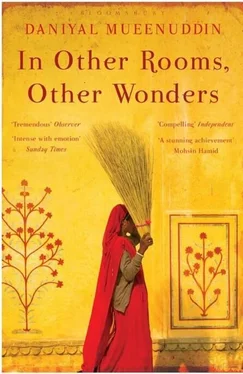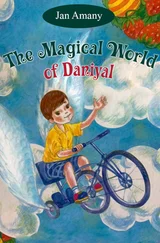‘Did they kill the snake?’
A man went inside and brought out the cobra, black, three feet long, dangling like a hose over the stick with which he carried it. It slid off into the mud, making a soft slapping sound.
Back in his house, Jaglani found that he couldn’t sleep, that he wanted something, tea or some food. He hadn’t known the boy, though he had seen him about. The father had worked on the farm for twenty years, since childhood. Now he was a heavy-featured man with a few days’ muzzle of graying beard, his teeth almost gone, rather stupid, so that the other men made good-humored jokes about him.
Jaglani pushed the bell button, which rang out in the dera where the watchman could hear it.
‘I’m not feeling well,’ he told the watchman. ‘Call Zainab and tell her to make me some tea. I’ve got a fever.’
‘Shall I send Mustafa for medicine?’
‘No, in the morning I’ll go back to Firoza. Just tea.’
Zainab came into the room, walking quietly as always. ‘I’m sorry you’re not well.’
‘Come here,’ said Jaglani. He took her by the wrist and pulled her down onto the bed. She didn’t resist, but instead, with a single motion removed her kurta, pulling it over her head. As she came onto the bed she kicked off her shoes.
Rolling on top of her, he searched her face.
‘I need you to be here in the house whenever I’m here.’ He looked directly into her eyes.
‘I told you, I won’t. I’ll go away.’
‘Where can you go?’
‘My husband has written three times. He says he’ll take me back. I’ll go there.’
Jaglani lay staring at the ceiling, his emotions tightened up almost unbearably.
‘I’ll marry you,’ he said.
‘What about my husband?’
‘I’ll arrange it.’
She turned and began kissing him, looking down on his face. He closed his eyes.
Jaglani knew that his wife, who was also his first cousin, would try to turn their common family against him if he took another wife. In the next few days he didn’t mention his offer of marriage again, although it lay between them. Zainab became harder and more emotionally inflexible than before. She did what he asked. Again and always in bed, sexually, she opened and became almost vicious, pliable, biting him, on his cheeks, his neck; but after they finished she withdrew into herself. Only sometimes, when they lay in bed, she would cough or feel cold and he would offer to do something for her, to bring water or to find a blanket, and she would say, ‘Yes, please,’ in a girlish voice that wrung his heart. Finally he could not deny to himself that he had fallen in love, for the first time in his life. He even acknowledged her aloof coldness, the possibility that she would mar his life. And yet he felt that he had risen so far, had become invulnerable to the judgments of those around him, had become preeminent in this area by the Indus River, and now he deserved to make this mistake, for once not to make a calculated choice, but to surrender to his desire.
In the beginning of September, after the monsoon, the immense Punjabi heat began to subside. One morning when Zainab brought his breakfast he said to her, ‘Your husband comes today.’
‘Why?’
‘I’ve called him. He needs to sign the divorce papers.’
‘He won’t do that.’
Jaglani looked up at her as she leaned forward placing the tray of food on the table in front of him. ‘You still don’t know me, do you?’
In the late afternoon Zainab’s husband, a peasant named Aslam born in Dunyapur, entered the dera, a small figure advancing through the whitewashed brick gates, having walked from the main road, where the intercity bus dropped him off.
Jaglani sat under the banyan tree, signing cash vouchers passed to him by an aged accountant wearing spectacles mended with wire.
Aslam approached, said his salaam, and touched Jaglani’s knee.
‘Hello Aslam,’ said Jaglani. ‘I’ll call you, go sit.’
Seven or eight men sat in chairs under a verandah, all waiting to see Jaglani, with petitions of various kinds — a stolen ox, water issues, begging for jobs, needing letters to local government administrators.
Jaglani saw Aslam last of all, several hours later. The sky had darkened, and the maulvi in the plain but large marbled mosque built by the Harounis had finished the maghreb call for prayer, standing on a platform, his voice reedy.
‘Aslam, you can’t seem to control your wife,’ began Jaglani, without any preamble.
‘No sir. She ran back to the village. I’m here, and I intend to take her home.’
‘I’m told she doesn’t want to go. You’d better divorce her.’
‘Sir, no. My house is empty, every night I come home and it’s empty.’
‘Why don’t you have children?’ asked Jaglani. ‘Didn’t you live with her as her husband?’
‘In the beginning we tried. We had no luck.’
‘That’s grounds for divorce. I suggest you divorce her for being barren.’
‘Please, Chaudrey Sahib, you and I grew up together in Dunyapur, we played together as children. I beg you, don’t take what’s mine. You have so much, and I so little.’
‘I have so much because I took what I wanted. Go away.’
The husband said, ‘Take her and be damned with her,’ but Jaglani ignored him.
The next morning one of the farm accountants presented Aslam with some papers. Knowing the husband to be illiterate, and wishing to spare him further humiliation, the accountant assured him that the papers simply gave Zainab permission to live apart. Aslam left Dunyapur with a letter to the manager of the bank where he worked in Rawalpindi. In the letter Jaglani requested that the manager, a dependent of the Harounis, give Aslam a raise and watch over him.
A few weeks later Jaglani secretly married Zainab. The maulvi from the mosque came quietly into Chaudrey Sahib’s house one morning, bringing with him one of the old managers to act as a witness. The villagers bullied the maulvi, a timid man with a scrawny beard. He blushed when he spoke, and would ask the cook in the dera for little treats from the common pot to take home for his wife, as his pay barely covered their thin monthly expenditure. The manager, by contrast, cuffed his men about and had a voice like a baying hound. Coming across the courtyard of the dera, under the blowing trees, the maulvi turned to the manager.
‘Won’t Jaglani’s sons blame us for this?’
‘Don’t worry,’said the manager, ‘there’s not enough blood in their livers to clog the foot of a flea. Even when the big man dies they’ll be afraid to cross him. And she can take care of herself, she’s like a hatchet.’
When they entered the courtyard of the little house they found Jaglani sitting on a charpoy smoking his hookah. The two men sat down, and while the maulvi watched, Jaglani and the manager spoke of the September cane sowing, just completed, and of the cotton just then developing bolls. The manager picked at a callus on his foot. After a few minutes the register of deeds, a man who owed his posting in the area to Jaglani, and who had collaborated in numerous dubious land transfers, entered with the marriage papers in a big ledger under his arm. He took from his pocket a gold pen worth several months of his official salary and began filling out the forms, writing in an elegant hand, and with a look of satisfaction on his face. He loved these forms, loved consummating rich transactions. Jaglani signed, the single witness signed, and then the maulvi rose and said a prayer, his hands cupped, speaking rapidly and with perfect memory. The other three required witnesses would sign later, if the need arose — the register of deeds had urged that they leave the document incomplete to this degree. Under the trees and with the birds calling, Jaglani felt extremely moved, felt his emotions to be like clear glass. He took the papers inside and Zainab affixed her thumbprint, leaning against him as they sat on the bed, her face soft. When he had insisted upon keeping the marriage secret she made only one stipulation — that they no longer would use birth control.
Читать дальше












